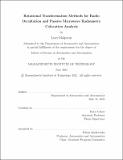| dc.contributor.advisor | Cahoy, Kerri | |
| dc.contributor.author | Halperin, Lucy | |
| dc.date.accessioned | 2022-01-14T15:11:43Z | |
| dc.date.available | 2022-01-14T15:11:43Z | |
| dc.date.issued | 2021-06 | |
| dc.date.submitted | 2021-06-16T13:26:31.645Z | |
| dc.identifier.uri | https://hdl.handle.net/1721.1/139442 | |
| dc.description.abstract | Global Navigation Satellite System Radio Occultation (GNSS-RO) and passive microwave radiometry (MWR) provide useful atmospheric profiles for inputs into Numerical Weather Prediction models. However, both remote sensing techniques face unique challenges that require auxiliary atmospheric data to mitigate. GNSS-RO provides extremely high vertical resolution retrievals in the Marine Boundary Layer but by itself is unable to distinguish between the contributions of water vapor and the “dry” atmosphere. MWR instruments have inherent biases in antenna temperature. GNSS-RO and MWR measurements taken within the same atmospheric volume at approximately the same time are mutually beneficial: each sensing technique provides the constraints needed by the other to solve its aforementioned profiling issue. This work introduces a fast, approximate method for analyzing the presence of colocated GNSS-RO/MWR measurements that requires only Two-Line Element (TLE) MWR data. The method applies a rotational transformation to map GNSS-RO soundings into the coordinate system natural to a cross-track scanning MWR satellite. The rotational transformation method is compared to the typical “brute force” colocation determination method and found to compute colocations 20x faster, with an average accuracy within 1.5% of “brute force” colocated occultations. Two initial applications of the rotational transformation colocation determination method are explored: a comprehensive study of the colocations occurring among active GNSS-RO and MWR missions, and colocation analysis of a proposed MWR constellation aimed to maximize colocations with the COSMIC-2 constellation. | |
| dc.publisher | Massachusetts Institute of Technology | |
| dc.rights | In Copyright - Educational Use Permitted | |
| dc.rights | Copyright MIT | |
| dc.rights.uri | http://rightsstatements.org/page/InC-EDU/1.0/ | |
| dc.title | Rotational Transformation Methods for Radio Occultation and Passive Microwave Radiometry Colocation Analysis | |
| dc.type | Thesis | |
| dc.description.degree | S.M. | |
| dc.contributor.department | Massachusetts Institute of Technology. Department of Aeronautics and Astronautics | |
| mit.thesis.degree | Master | |
| thesis.degree.name | Master of Science in Aeronautics and Astronautics | |
